Strategic and Change Management: Africa Calling Mobile Telecoms Report
VerifiedAdded on 2020/05/16
|22
|6285
|450
Report
AI Summary
This report provides a comprehensive analysis of the strategic and change management practices within the African telecommunications industry. It begins with an overview of the industry's driving forces, including political support, risk-taking companies, and the elevated demand for communication, particularly mobile services. The report evaluates how African mobile telephone companies have addressed these forces, highlighting strategies employed by major players like MTN Group and MSI Cellular. It critically discusses the risks and benefits associated with African companies expanding beyond their home countries, focusing on political, social, and economic challenges. Furthermore, the report delves into organizational change management, examining the reasons for its increasing importance and the factors that contribute to the failure of change initiatives. It assesses the role of organizational culture in leading change and evaluates the role of leadership in driving successful organizational change initiatives, referencing guiding principles from a case study. The report concludes with a synthesis of key findings and recommendations for strategic and change management in the African telecom sector.
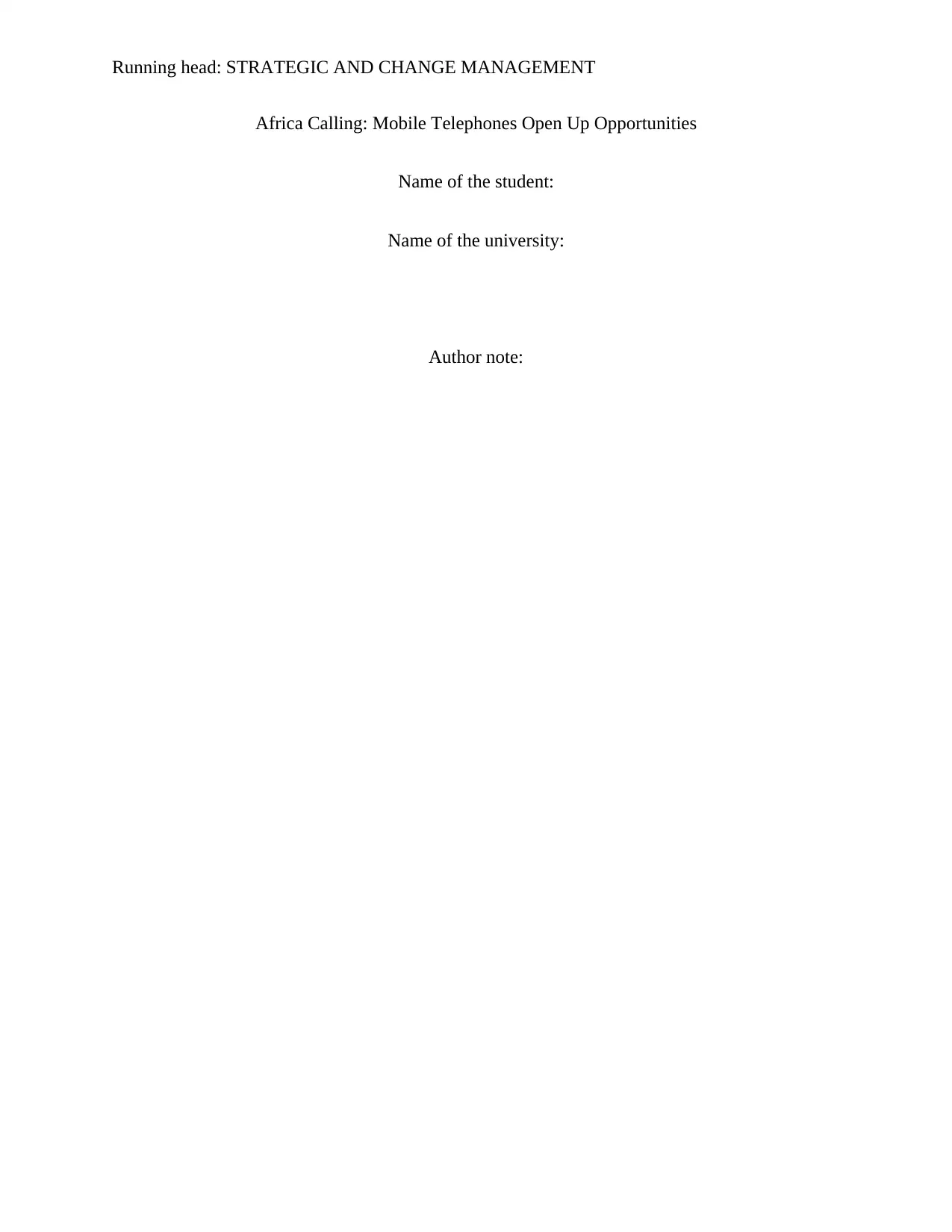
Running head: STRATEGIC AND CHANGE MANAGEMENT
Africa Calling: Mobile Telephones Open Up Opportunities
Name of the student:
Name of the university:
Author note:
Africa Calling: Mobile Telephones Open Up Opportunities
Name of the student:
Name of the university:
Author note:
Paraphrase This Document
Need a fresh take? Get an instant paraphrase of this document with our AI Paraphraser
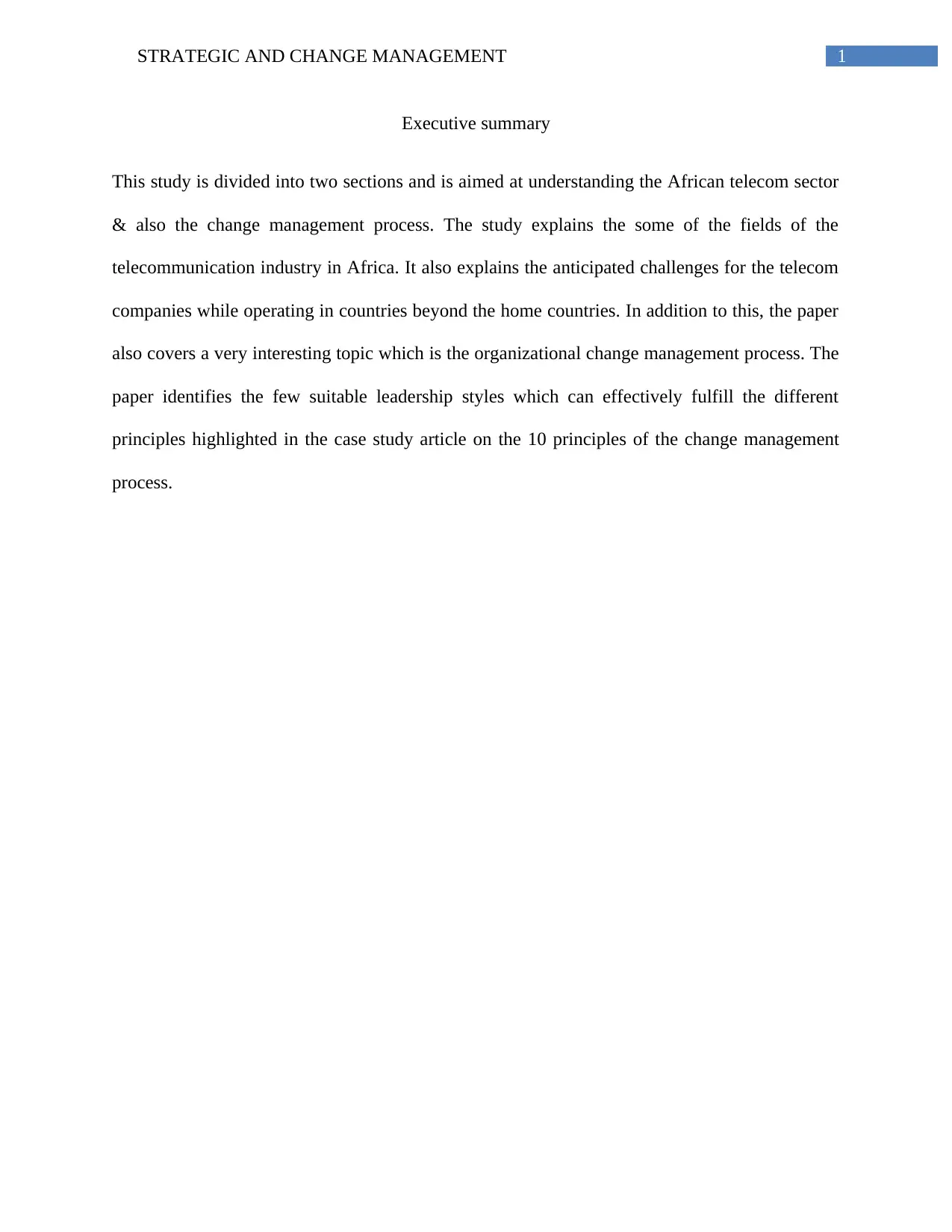
1STRATEGIC AND CHANGE MANAGEMENT
Executive summary
This study is divided into two sections and is aimed at understanding the African telecom sector
& also the change management process. The study explains the some of the fields of the
telecommunication industry in Africa. It also explains the anticipated challenges for the telecom
companies while operating in countries beyond the home countries. In addition to this, the paper
also covers a very interesting topic which is the organizational change management process. The
paper identifies the few suitable leadership styles which can effectively fulfill the different
principles highlighted in the case study article on the 10 principles of the change management
process.
Executive summary
This study is divided into two sections and is aimed at understanding the African telecom sector
& also the change management process. The study explains the some of the fields of the
telecommunication industry in Africa. It also explains the anticipated challenges for the telecom
companies while operating in countries beyond the home countries. In addition to this, the paper
also covers a very interesting topic which is the organizational change management process. The
paper identifies the few suitable leadership styles which can effectively fulfill the different
principles highlighted in the case study article on the 10 principles of the change management
process.
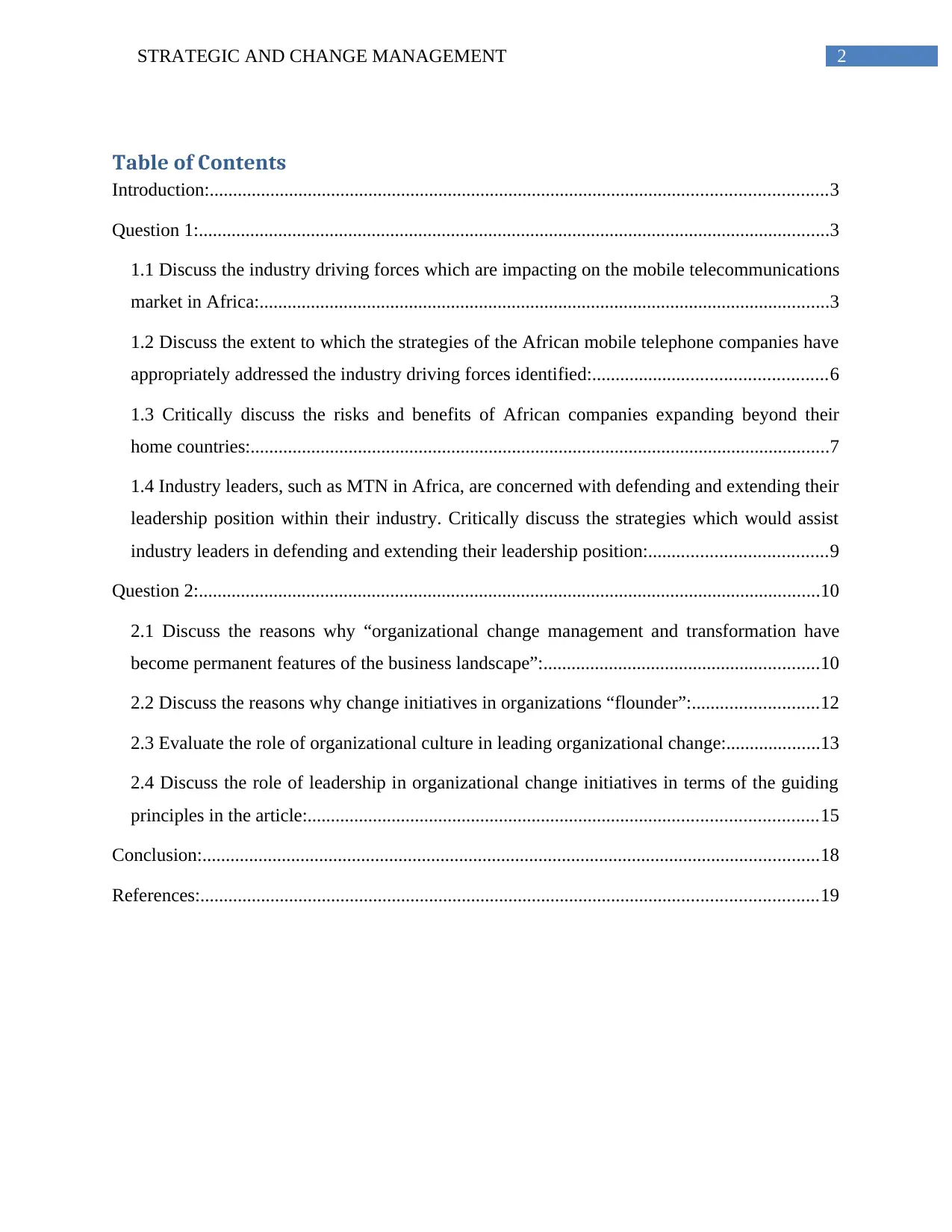
2STRATEGIC AND CHANGE MANAGEMENT
Table of Contents
Introduction:....................................................................................................................................3
Question 1:.......................................................................................................................................3
1.1 Discuss the industry driving forces which are impacting on the mobile telecommunications
market in Africa:..........................................................................................................................3
1.2 Discuss the extent to which the strategies of the African mobile telephone companies have
appropriately addressed the industry driving forces identified:..................................................6
1.3 Critically discuss the risks and benefits of African companies expanding beyond their
home countries:............................................................................................................................7
1.4 Industry leaders, such as MTN in Africa, are concerned with defending and extending their
leadership position within their industry. Critically discuss the strategies which would assist
industry leaders in defending and extending their leadership position:......................................9
Question 2:.....................................................................................................................................10
2.1 Discuss the reasons why “organizational change management and transformation have
become permanent features of the business landscape”:...........................................................10
2.2 Discuss the reasons why change initiatives in organizations “flounder”:...........................12
2.3 Evaluate the role of organizational culture in leading organizational change:....................13
2.4 Discuss the role of leadership in organizational change initiatives in terms of the guiding
principles in the article:.............................................................................................................15
Conclusion:....................................................................................................................................18
References:....................................................................................................................................19
Table of Contents
Introduction:....................................................................................................................................3
Question 1:.......................................................................................................................................3
1.1 Discuss the industry driving forces which are impacting on the mobile telecommunications
market in Africa:..........................................................................................................................3
1.2 Discuss the extent to which the strategies of the African mobile telephone companies have
appropriately addressed the industry driving forces identified:..................................................6
1.3 Critically discuss the risks and benefits of African companies expanding beyond their
home countries:............................................................................................................................7
1.4 Industry leaders, such as MTN in Africa, are concerned with defending and extending their
leadership position within their industry. Critically discuss the strategies which would assist
industry leaders in defending and extending their leadership position:......................................9
Question 2:.....................................................................................................................................10
2.1 Discuss the reasons why “organizational change management and transformation have
become permanent features of the business landscape”:...........................................................10
2.2 Discuss the reasons why change initiatives in organizations “flounder”:...........................12
2.3 Evaluate the role of organizational culture in leading organizational change:....................13
2.4 Discuss the role of leadership in organizational change initiatives in terms of the guiding
principles in the article:.............................................................................................................15
Conclusion:....................................................................................................................................18
References:....................................................................................................................................19
⊘ This is a preview!⊘
Do you want full access?
Subscribe today to unlock all pages.

Trusted by 1+ million students worldwide
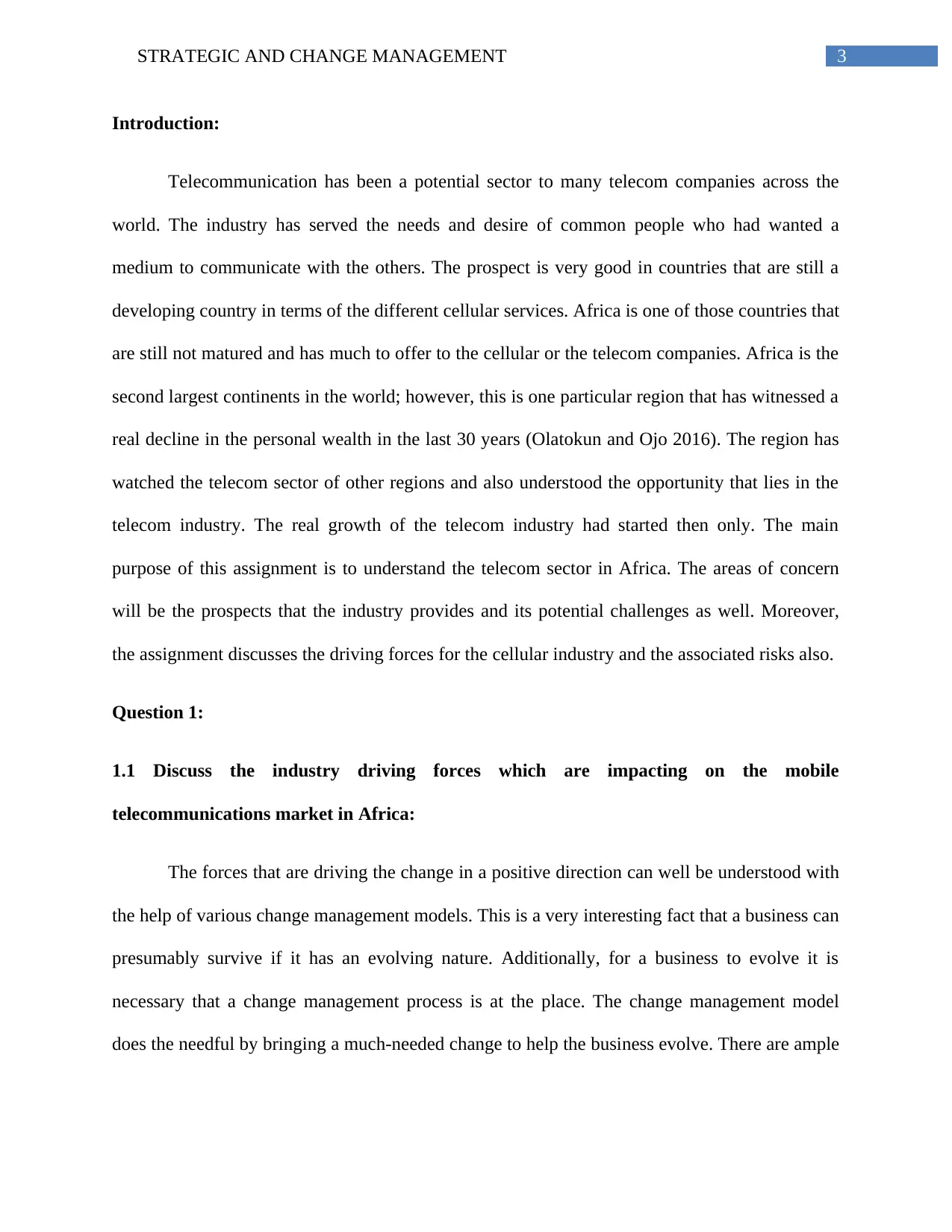
3STRATEGIC AND CHANGE MANAGEMENT
Introduction:
Telecommunication has been a potential sector to many telecom companies across the
world. The industry has served the needs and desire of common people who had wanted a
medium to communicate with the others. The prospect is very good in countries that are still a
developing country in terms of the different cellular services. Africa is one of those countries that
are still not matured and has much to offer to the cellular or the telecom companies. Africa is the
second largest continents in the world; however, this is one particular region that has witnessed a
real decline in the personal wealth in the last 30 years (Olatokun and Ojo 2016). The region has
watched the telecom sector of other regions and also understood the opportunity that lies in the
telecom industry. The real growth of the telecom industry had started then only. The main
purpose of this assignment is to understand the telecom sector in Africa. The areas of concern
will be the prospects that the industry provides and its potential challenges as well. Moreover,
the assignment discusses the driving forces for the cellular industry and the associated risks also.
Question 1:
1.1 Discuss the industry driving forces which are impacting on the mobile
telecommunications market in Africa:
The forces that are driving the change in a positive direction can well be understood with
the help of various change management models. This is a very interesting fact that a business can
presumably survive if it has an evolving nature. Additionally, for a business to evolve it is
necessary that a change management process is at the place. The change management model
does the needful by bringing a much-needed change to help the business evolve. There are ample
Introduction:
Telecommunication has been a potential sector to many telecom companies across the
world. The industry has served the needs and desire of common people who had wanted a
medium to communicate with the others. The prospect is very good in countries that are still a
developing country in terms of the different cellular services. Africa is one of those countries that
are still not matured and has much to offer to the cellular or the telecom companies. Africa is the
second largest continents in the world; however, this is one particular region that has witnessed a
real decline in the personal wealth in the last 30 years (Olatokun and Ojo 2016). The region has
watched the telecom sector of other regions and also understood the opportunity that lies in the
telecom industry. The real growth of the telecom industry had started then only. The main
purpose of this assignment is to understand the telecom sector in Africa. The areas of concern
will be the prospects that the industry provides and its potential challenges as well. Moreover,
the assignment discusses the driving forces for the cellular industry and the associated risks also.
Question 1:
1.1 Discuss the industry driving forces which are impacting on the mobile
telecommunications market in Africa:
The forces that are driving the change in a positive direction can well be understood with
the help of various change management models. This is a very interesting fact that a business can
presumably survive if it has an evolving nature. Additionally, for a business to evolve it is
necessary that a change management process is at the place. The change management model
does the needful by bringing a much-needed change to help the business evolve. There are ample
Paraphrase This Document
Need a fresh take? Get an instant paraphrase of this document with our AI Paraphraser
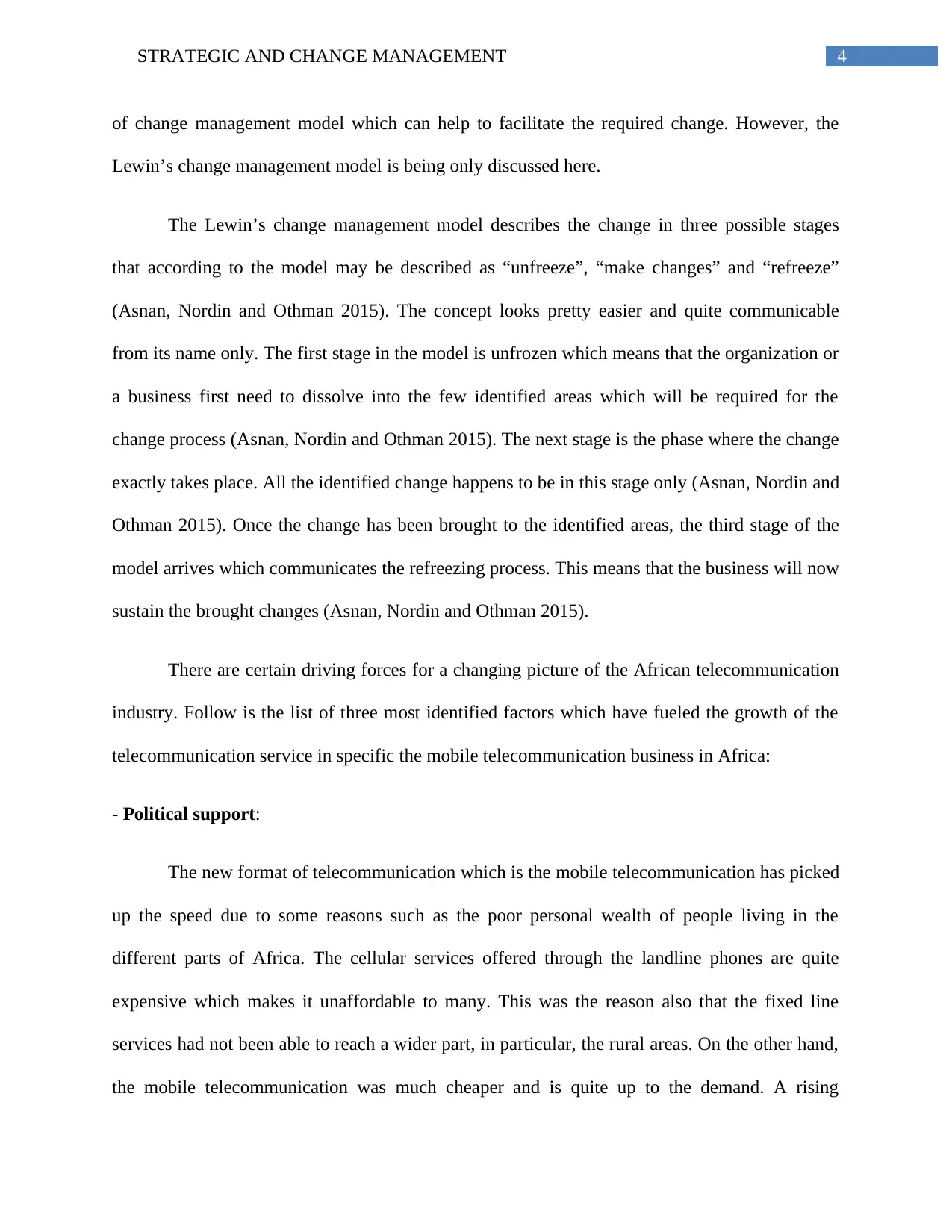
4STRATEGIC AND CHANGE MANAGEMENT
of change management model which can help to facilitate the required change. However, the
Lewin’s change management model is being only discussed here.
The Lewin’s change management model describes the change in three possible stages
that according to the model may be described as “unfreeze”, “make changes” and “refreeze”
(Asnan, Nordin and Othman 2015). The concept looks pretty easier and quite communicable
from its name only. The first stage in the model is unfrozen which means that the organization or
a business first need to dissolve into the few identified areas which will be required for the
change process (Asnan, Nordin and Othman 2015). The next stage is the phase where the change
exactly takes place. All the identified change happens to be in this stage only (Asnan, Nordin and
Othman 2015). Once the change has been brought to the identified areas, the third stage of the
model arrives which communicates the refreezing process. This means that the business will now
sustain the brought changes (Asnan, Nordin and Othman 2015).
There are certain driving forces for a changing picture of the African telecommunication
industry. Follow is the list of three most identified factors which have fueled the growth of the
telecommunication service in specific the mobile telecommunication business in Africa:
- Political support:
The new format of telecommunication which is the mobile telecommunication has picked
up the speed due to some reasons such as the poor personal wealth of people living in the
different parts of Africa. The cellular services offered through the landline phones are quite
expensive which makes it unaffordable to many. This was the reason also that the fixed line
services had not been able to reach a wider part, in particular, the rural areas. On the other hand,
the mobile telecommunication was much cheaper and is quite up to the demand. A rising
of change management model which can help to facilitate the required change. However, the
Lewin’s change management model is being only discussed here.
The Lewin’s change management model describes the change in three possible stages
that according to the model may be described as “unfreeze”, “make changes” and “refreeze”
(Asnan, Nordin and Othman 2015). The concept looks pretty easier and quite communicable
from its name only. The first stage in the model is unfrozen which means that the organization or
a business first need to dissolve into the few identified areas which will be required for the
change process (Asnan, Nordin and Othman 2015). The next stage is the phase where the change
exactly takes place. All the identified change happens to be in this stage only (Asnan, Nordin and
Othman 2015). Once the change has been brought to the identified areas, the third stage of the
model arrives which communicates the refreezing process. This means that the business will now
sustain the brought changes (Asnan, Nordin and Othman 2015).
There are certain driving forces for a changing picture of the African telecommunication
industry. Follow is the list of three most identified factors which have fueled the growth of the
telecommunication service in specific the mobile telecommunication business in Africa:
- Political support:
The new format of telecommunication which is the mobile telecommunication has picked
up the speed due to some reasons such as the poor personal wealth of people living in the
different parts of Africa. The cellular services offered through the landline phones are quite
expensive which makes it unaffordable to many. This was the reason also that the fixed line
services had not been able to reach a wider part, in particular, the rural areas. On the other hand,
the mobile telecommunication was much cheaper and is quite up to the demand. A rising
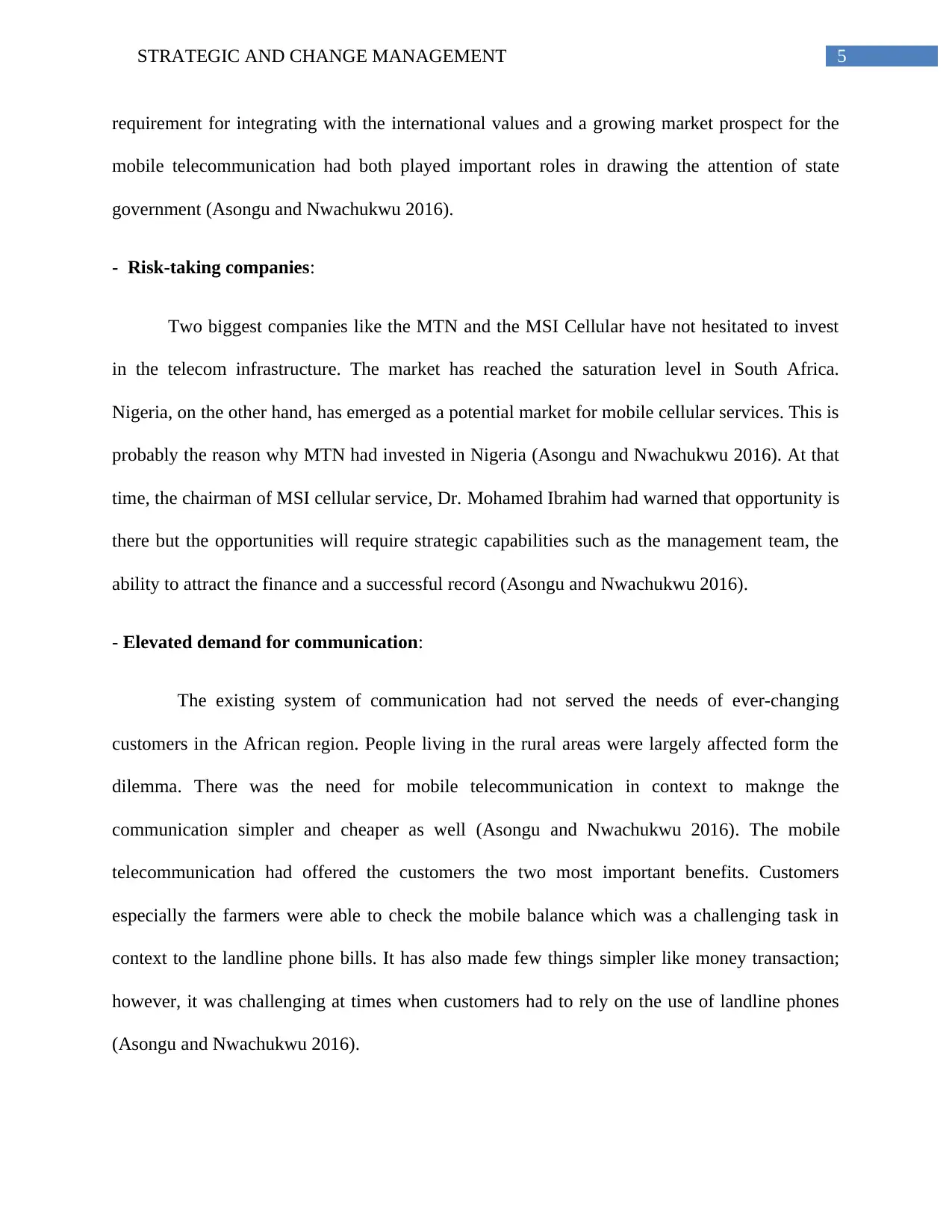
5STRATEGIC AND CHANGE MANAGEMENT
requirement for integrating with the international values and a growing market prospect for the
mobile telecommunication had both played important roles in drawing the attention of state
government (Asongu and Nwachukwu 2016).
- Risk-taking companies:
Two biggest companies like the MTN and the MSI Cellular have not hesitated to invest
in the telecom infrastructure. The market has reached the saturation level in South Africa.
Nigeria, on the other hand, has emerged as a potential market for mobile cellular services. This is
probably the reason why MTN had invested in Nigeria (Asongu and Nwachukwu 2016). At that
time, the chairman of MSI cellular service, Dr. Mohamed Ibrahim had warned that opportunity is
there but the opportunities will require strategic capabilities such as the management team, the
ability to attract the finance and a successful record (Asongu and Nwachukwu 2016).
- Elevated demand for communication:
The existing system of communication had not served the needs of ever-changing
customers in the African region. People living in the rural areas were largely affected form the
dilemma. There was the need for mobile telecommunication in context to maknge the
communication simpler and cheaper as well (Asongu and Nwachukwu 2016). The mobile
telecommunication had offered the customers the two most important benefits. Customers
especially the farmers were able to check the mobile balance which was a challenging task in
context to the landline phone bills. It has also made few things simpler like money transaction;
however, it was challenging at times when customers had to rely on the use of landline phones
(Asongu and Nwachukwu 2016).
requirement for integrating with the international values and a growing market prospect for the
mobile telecommunication had both played important roles in drawing the attention of state
government (Asongu and Nwachukwu 2016).
- Risk-taking companies:
Two biggest companies like the MTN and the MSI Cellular have not hesitated to invest
in the telecom infrastructure. The market has reached the saturation level in South Africa.
Nigeria, on the other hand, has emerged as a potential market for mobile cellular services. This is
probably the reason why MTN had invested in Nigeria (Asongu and Nwachukwu 2016). At that
time, the chairman of MSI cellular service, Dr. Mohamed Ibrahim had warned that opportunity is
there but the opportunities will require strategic capabilities such as the management team, the
ability to attract the finance and a successful record (Asongu and Nwachukwu 2016).
- Elevated demand for communication:
The existing system of communication had not served the needs of ever-changing
customers in the African region. People living in the rural areas were largely affected form the
dilemma. There was the need for mobile telecommunication in context to maknge the
communication simpler and cheaper as well (Asongu and Nwachukwu 2016). The mobile
telecommunication had offered the customers the two most important benefits. Customers
especially the farmers were able to check the mobile balance which was a challenging task in
context to the landline phone bills. It has also made few things simpler like money transaction;
however, it was challenging at times when customers had to rely on the use of landline phones
(Asongu and Nwachukwu 2016).
⊘ This is a preview!⊘
Do you want full access?
Subscribe today to unlock all pages.

Trusted by 1+ million students worldwide
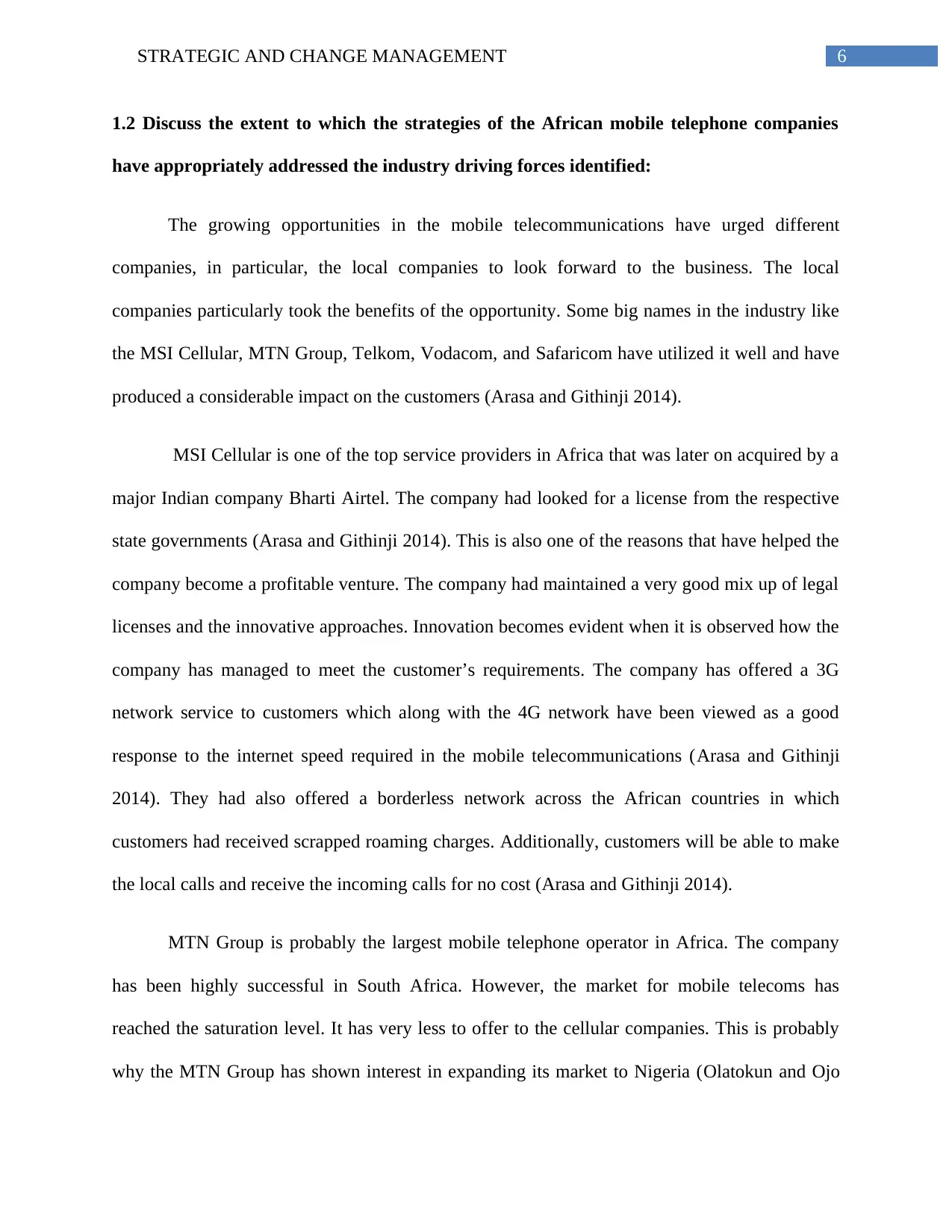
6STRATEGIC AND CHANGE MANAGEMENT
1.2 Discuss the extent to which the strategies of the African mobile telephone companies
have appropriately addressed the industry driving forces identified:
The growing opportunities in the mobile telecommunications have urged different
companies, in particular, the local companies to look forward to the business. The local
companies particularly took the benefits of the opportunity. Some big names in the industry like
the MSI Cellular, MTN Group, Telkom, Vodacom, and Safaricom have utilized it well and have
produced a considerable impact on the customers (Arasa and Githinji 2014).
MSI Cellular is one of the top service providers in Africa that was later on acquired by a
major Indian company Bharti Airtel. The company had looked for a license from the respective
state governments (Arasa and Githinji 2014). This is also one of the reasons that have helped the
company become a profitable venture. The company had maintained a very good mix up of legal
licenses and the innovative approaches. Innovation becomes evident when it is observed how the
company has managed to meet the customer’s requirements. The company has offered a 3G
network service to customers which along with the 4G network have been viewed as a good
response to the internet speed required in the mobile telecommunications (Arasa and Githinji
2014). They had also offered a borderless network across the African countries in which
customers had received scrapped roaming charges. Additionally, customers will be able to make
the local calls and receive the incoming calls for no cost (Arasa and Githinji 2014).
MTN Group is probably the largest mobile telephone operator in Africa. The company
has been highly successful in South Africa. However, the market for mobile telecoms has
reached the saturation level. It has very less to offer to the cellular companies. This is probably
why the MTN Group has shown interest in expanding its market to Nigeria (Olatokun and Ojo
1.2 Discuss the extent to which the strategies of the African mobile telephone companies
have appropriately addressed the industry driving forces identified:
The growing opportunities in the mobile telecommunications have urged different
companies, in particular, the local companies to look forward to the business. The local
companies particularly took the benefits of the opportunity. Some big names in the industry like
the MSI Cellular, MTN Group, Telkom, Vodacom, and Safaricom have utilized it well and have
produced a considerable impact on the customers (Arasa and Githinji 2014).
MSI Cellular is one of the top service providers in Africa that was later on acquired by a
major Indian company Bharti Airtel. The company had looked for a license from the respective
state governments (Arasa and Githinji 2014). This is also one of the reasons that have helped the
company become a profitable venture. The company had maintained a very good mix up of legal
licenses and the innovative approaches. Innovation becomes evident when it is observed how the
company has managed to meet the customer’s requirements. The company has offered a 3G
network service to customers which along with the 4G network have been viewed as a good
response to the internet speed required in the mobile telecommunications (Arasa and Githinji
2014). They had also offered a borderless network across the African countries in which
customers had received scrapped roaming charges. Additionally, customers will be able to make
the local calls and receive the incoming calls for no cost (Arasa and Githinji 2014).
MTN Group is probably the largest mobile telephone operator in Africa. The company
has been highly successful in South Africa. However, the market for mobile telecoms has
reached the saturation level. It has very less to offer to the cellular companies. This is probably
why the MTN Group has shown interest in expanding its market to Nigeria (Olatokun and Ojo
Paraphrase This Document
Need a fresh take? Get an instant paraphrase of this document with our AI Paraphraser
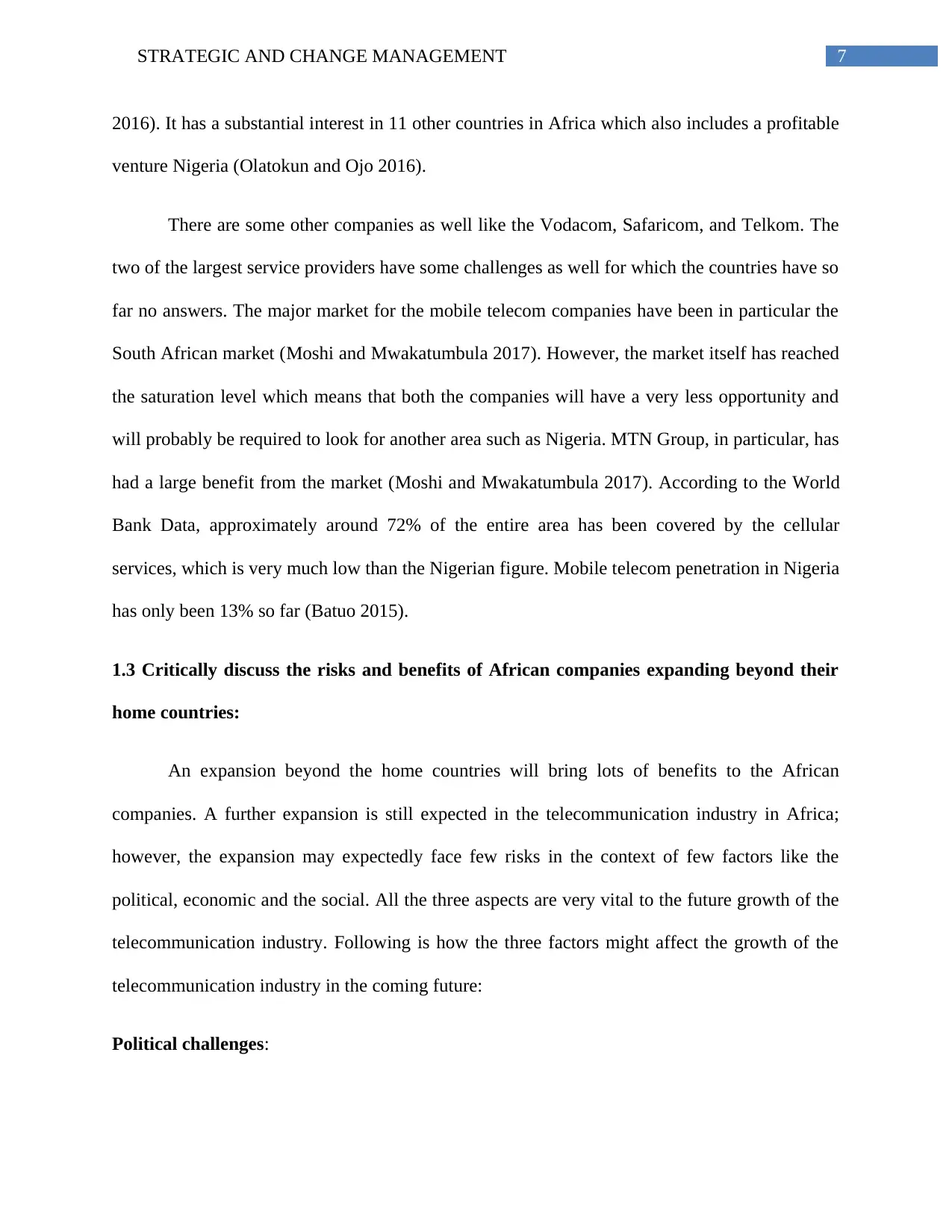
7STRATEGIC AND CHANGE MANAGEMENT
2016). It has a substantial interest in 11 other countries in Africa which also includes a profitable
venture Nigeria (Olatokun and Ojo 2016).
There are some other companies as well like the Vodacom, Safaricom, and Telkom. The
two of the largest service providers have some challenges as well for which the countries have so
far no answers. The major market for the mobile telecom companies have been in particular the
South African market (Moshi and Mwakatumbula 2017). However, the market itself has reached
the saturation level which means that both the companies will have a very less opportunity and
will probably be required to look for another area such as Nigeria. MTN Group, in particular, has
had a large benefit from the market (Moshi and Mwakatumbula 2017). According to the World
Bank Data, approximately around 72% of the entire area has been covered by the cellular
services, which is very much low than the Nigerian figure. Mobile telecom penetration in Nigeria
has only been 13% so far (Batuo 2015).
1.3 Critically discuss the risks and benefits of African companies expanding beyond their
home countries:
An expansion beyond the home countries will bring lots of benefits to the African
companies. A further expansion is still expected in the telecommunication industry in Africa;
however, the expansion may expectedly face few risks in the context of few factors like the
political, economic and the social. All the three aspects are very vital to the future growth of the
telecommunication industry. Following is how the three factors might affect the growth of the
telecommunication industry in the coming future:
Political challenges:
2016). It has a substantial interest in 11 other countries in Africa which also includes a profitable
venture Nigeria (Olatokun and Ojo 2016).
There are some other companies as well like the Vodacom, Safaricom, and Telkom. The
two of the largest service providers have some challenges as well for which the countries have so
far no answers. The major market for the mobile telecom companies have been in particular the
South African market (Moshi and Mwakatumbula 2017). However, the market itself has reached
the saturation level which means that both the companies will have a very less opportunity and
will probably be required to look for another area such as Nigeria. MTN Group, in particular, has
had a large benefit from the market (Moshi and Mwakatumbula 2017). According to the World
Bank Data, approximately around 72% of the entire area has been covered by the cellular
services, which is very much low than the Nigerian figure. Mobile telecom penetration in Nigeria
has only been 13% so far (Batuo 2015).
1.3 Critically discuss the risks and benefits of African companies expanding beyond their
home countries:
An expansion beyond the home countries will bring lots of benefits to the African
companies. A further expansion is still expected in the telecommunication industry in Africa;
however, the expansion may expectedly face few risks in the context of few factors like the
political, economic and the social. All the three aspects are very vital to the future growth of the
telecommunication industry. Following is how the three factors might affect the growth of the
telecommunication industry in the coming future:
Political challenges:
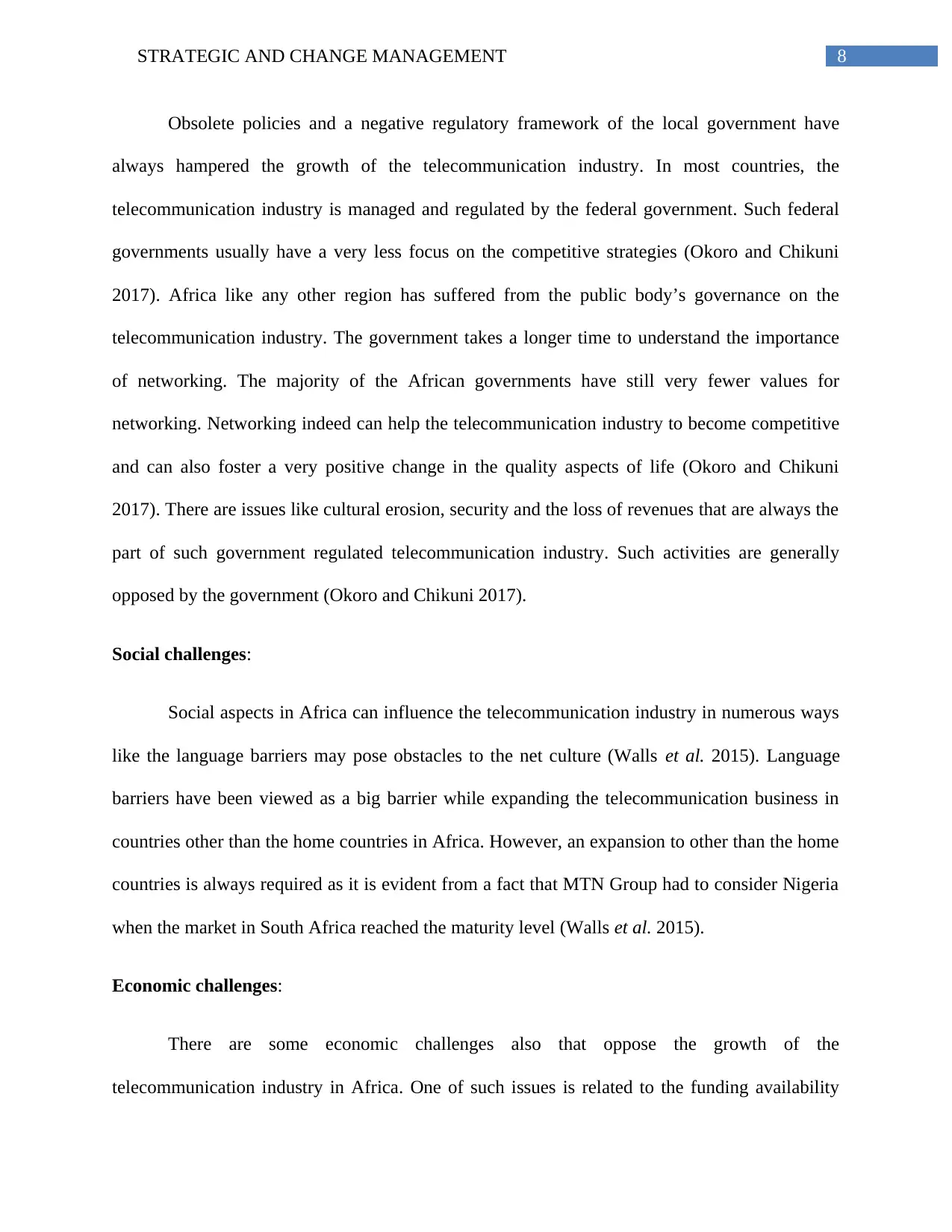
8STRATEGIC AND CHANGE MANAGEMENT
Obsolete policies and a negative regulatory framework of the local government have
always hampered the growth of the telecommunication industry. In most countries, the
telecommunication industry is managed and regulated by the federal government. Such federal
governments usually have a very less focus on the competitive strategies (Okoro and Chikuni
2017). Africa like any other region has suffered from the public body’s governance on the
telecommunication industry. The government takes a longer time to understand the importance
of networking. The majority of the African governments have still very fewer values for
networking. Networking indeed can help the telecommunication industry to become competitive
and can also foster a very positive change in the quality aspects of life (Okoro and Chikuni
2017). There are issues like cultural erosion, security and the loss of revenues that are always the
part of such government regulated telecommunication industry. Such activities are generally
opposed by the government (Okoro and Chikuni 2017).
Social challenges:
Social aspects in Africa can influence the telecommunication industry in numerous ways
like the language barriers may pose obstacles to the net culture (Walls et al. 2015). Language
barriers have been viewed as a big barrier while expanding the telecommunication business in
countries other than the home countries in Africa. However, an expansion to other than the home
countries is always required as it is evident from a fact that MTN Group had to consider Nigeria
when the market in South Africa reached the maturity level (Walls et al. 2015).
Economic challenges:
There are some economic challenges also that oppose the growth of the
telecommunication industry in Africa. One of such issues is related to the funding availability
Obsolete policies and a negative regulatory framework of the local government have
always hampered the growth of the telecommunication industry. In most countries, the
telecommunication industry is managed and regulated by the federal government. Such federal
governments usually have a very less focus on the competitive strategies (Okoro and Chikuni
2017). Africa like any other region has suffered from the public body’s governance on the
telecommunication industry. The government takes a longer time to understand the importance
of networking. The majority of the African governments have still very fewer values for
networking. Networking indeed can help the telecommunication industry to become competitive
and can also foster a very positive change in the quality aspects of life (Okoro and Chikuni
2017). There are issues like cultural erosion, security and the loss of revenues that are always the
part of such government regulated telecommunication industry. Such activities are generally
opposed by the government (Okoro and Chikuni 2017).
Social challenges:
Social aspects in Africa can influence the telecommunication industry in numerous ways
like the language barriers may pose obstacles to the net culture (Walls et al. 2015). Language
barriers have been viewed as a big barrier while expanding the telecommunication business in
countries other than the home countries in Africa. However, an expansion to other than the home
countries is always required as it is evident from a fact that MTN Group had to consider Nigeria
when the market in South Africa reached the maturity level (Walls et al. 2015).
Economic challenges:
There are some economic challenges also that oppose the growth of the
telecommunication industry in Africa. One of such issues is related to the funding availability
⊘ This is a preview!⊘
Do you want full access?
Subscribe today to unlock all pages.

Trusted by 1+ million students worldwide
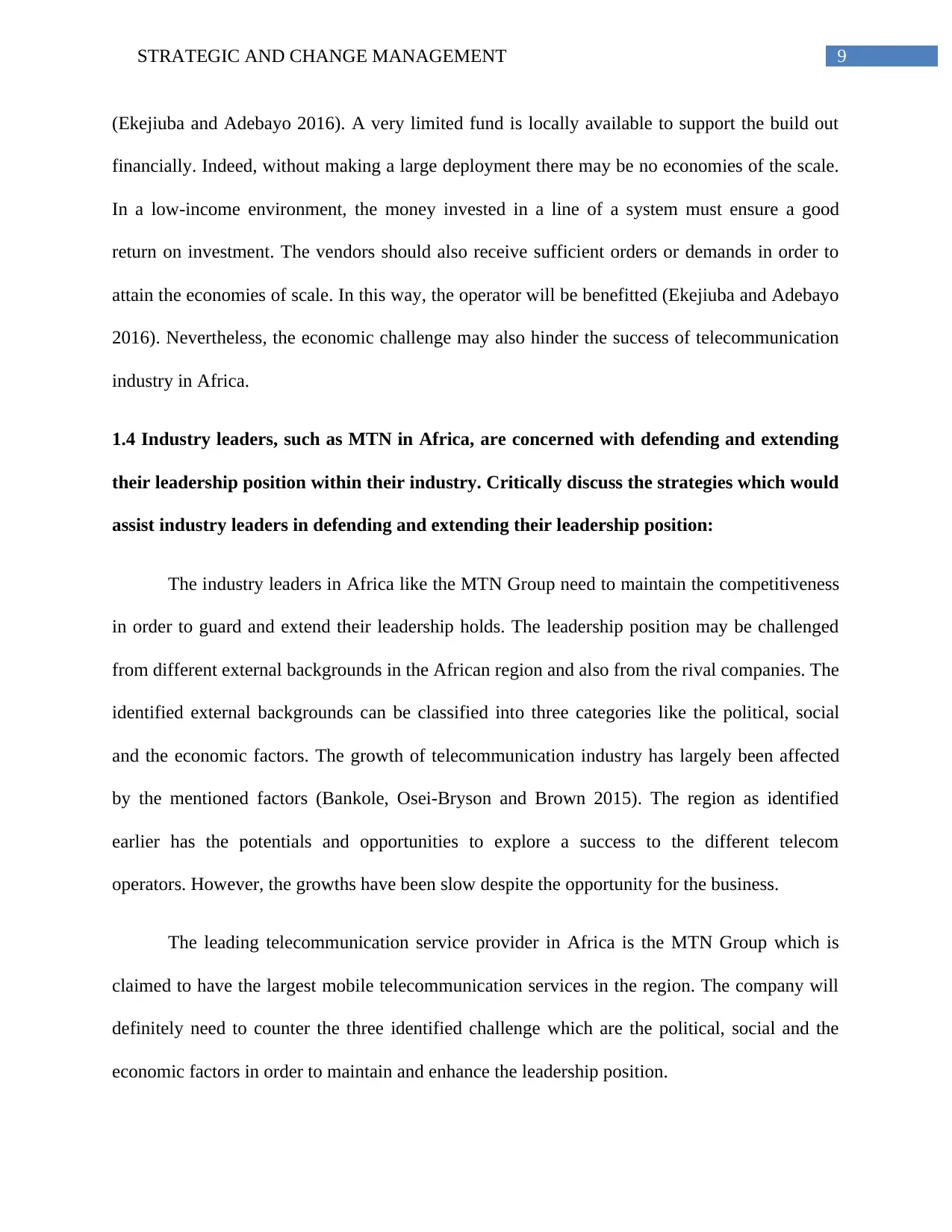
9STRATEGIC AND CHANGE MANAGEMENT
(Ekejiuba and Adebayo 2016). A very limited fund is locally available to support the build out
financially. Indeed, without making a large deployment there may be no economies of the scale.
In a low-income environment, the money invested in a line of a system must ensure a good
return on investment. The vendors should also receive sufficient orders or demands in order to
attain the economies of scale. In this way, the operator will be benefitted (Ekejiuba and Adebayo
2016). Nevertheless, the economic challenge may also hinder the success of telecommunication
industry in Africa.
1.4 Industry leaders, such as MTN in Africa, are concerned with defending and extending
their leadership position within their industry. Critically discuss the strategies which would
assist industry leaders in defending and extending their leadership position:
The industry leaders in Africa like the MTN Group need to maintain the competitiveness
in order to guard and extend their leadership holds. The leadership position may be challenged
from different external backgrounds in the African region and also from the rival companies. The
identified external backgrounds can be classified into three categories like the political, social
and the economic factors. The growth of telecommunication industry has largely been affected
by the mentioned factors (Bankole, Osei-Bryson and Brown 2015). The region as identified
earlier has the potentials and opportunities to explore a success to the different telecom
operators. However, the growths have been slow despite the opportunity for the business.
The leading telecommunication service provider in Africa is the MTN Group which is
claimed to have the largest mobile telecommunication services in the region. The company will
definitely need to counter the three identified challenge which are the political, social and the
economic factors in order to maintain and enhance the leadership position.
(Ekejiuba and Adebayo 2016). A very limited fund is locally available to support the build out
financially. Indeed, without making a large deployment there may be no economies of the scale.
In a low-income environment, the money invested in a line of a system must ensure a good
return on investment. The vendors should also receive sufficient orders or demands in order to
attain the economies of scale. In this way, the operator will be benefitted (Ekejiuba and Adebayo
2016). Nevertheless, the economic challenge may also hinder the success of telecommunication
industry in Africa.
1.4 Industry leaders, such as MTN in Africa, are concerned with defending and extending
their leadership position within their industry. Critically discuss the strategies which would
assist industry leaders in defending and extending their leadership position:
The industry leaders in Africa like the MTN Group need to maintain the competitiveness
in order to guard and extend their leadership holds. The leadership position may be challenged
from different external backgrounds in the African region and also from the rival companies. The
identified external backgrounds can be classified into three categories like the political, social
and the economic factors. The growth of telecommunication industry has largely been affected
by the mentioned factors (Bankole, Osei-Bryson and Brown 2015). The region as identified
earlier has the potentials and opportunities to explore a success to the different telecom
operators. However, the growths have been slow despite the opportunity for the business.
The leading telecommunication service provider in Africa is the MTN Group which is
claimed to have the largest mobile telecommunication services in the region. The company will
definitely need to counter the three identified challenge which are the political, social and the
economic factors in order to maintain and enhance the leadership position.
Paraphrase This Document
Need a fresh take? Get an instant paraphrase of this document with our AI Paraphraser
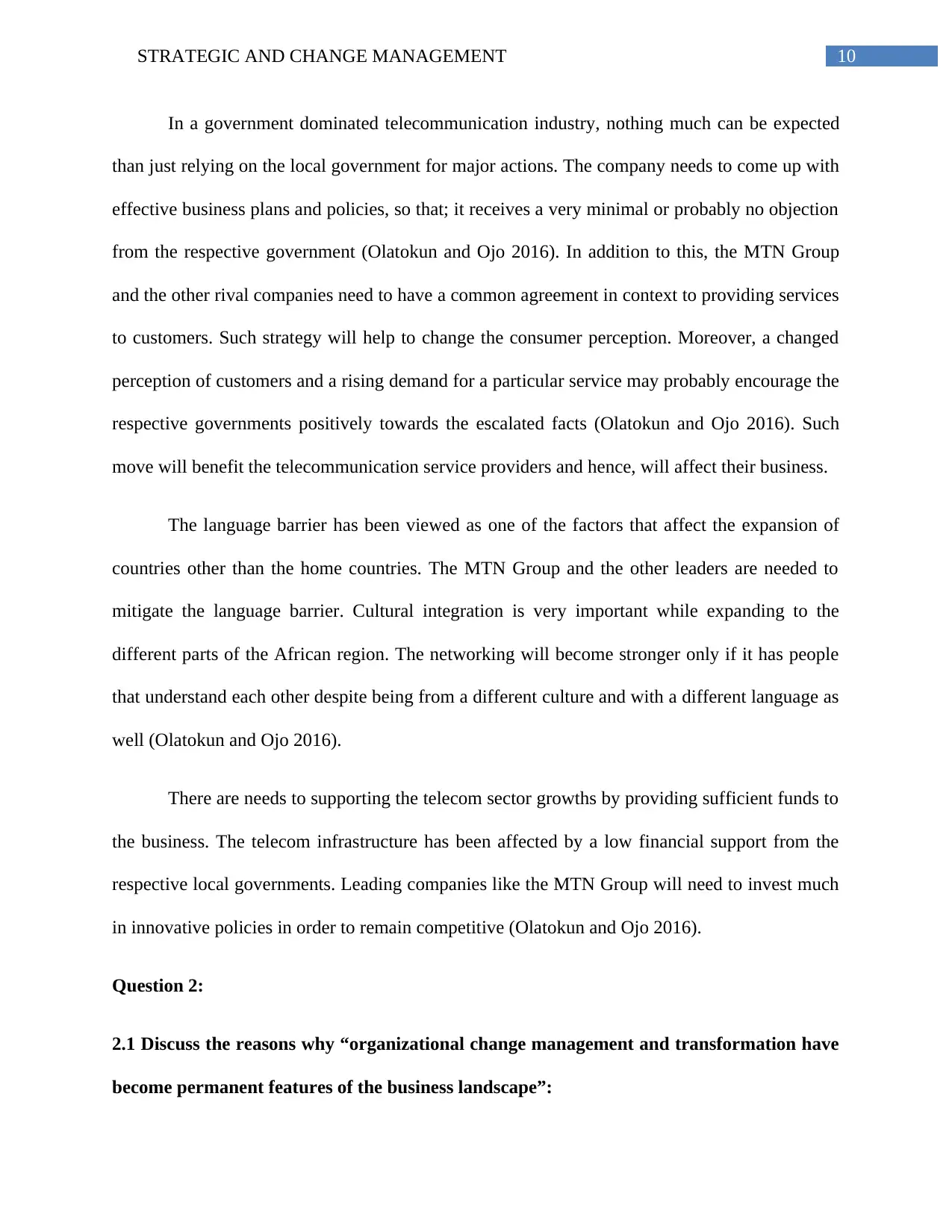
10STRATEGIC AND CHANGE MANAGEMENT
In a government dominated telecommunication industry, nothing much can be expected
than just relying on the local government for major actions. The company needs to come up with
effective business plans and policies, so that; it receives a very minimal or probably no objection
from the respective government (Olatokun and Ojo 2016). In addition to this, the MTN Group
and the other rival companies need to have a common agreement in context to providing services
to customers. Such strategy will help to change the consumer perception. Moreover, a changed
perception of customers and a rising demand for a particular service may probably encourage the
respective governments positively towards the escalated facts (Olatokun and Ojo 2016). Such
move will benefit the telecommunication service providers and hence, will affect their business.
The language barrier has been viewed as one of the factors that affect the expansion of
countries other than the home countries. The MTN Group and the other leaders are needed to
mitigate the language barrier. Cultural integration is very important while expanding to the
different parts of the African region. The networking will become stronger only if it has people
that understand each other despite being from a different culture and with a different language as
well (Olatokun and Ojo 2016).
There are needs to supporting the telecom sector growths by providing sufficient funds to
the business. The telecom infrastructure has been affected by a low financial support from the
respective local governments. Leading companies like the MTN Group will need to invest much
in innovative policies in order to remain competitive (Olatokun and Ojo 2016).
Question 2:
2.1 Discuss the reasons why “organizational change management and transformation have
become permanent features of the business landscape”:
In a government dominated telecommunication industry, nothing much can be expected
than just relying on the local government for major actions. The company needs to come up with
effective business plans and policies, so that; it receives a very minimal or probably no objection
from the respective government (Olatokun and Ojo 2016). In addition to this, the MTN Group
and the other rival companies need to have a common agreement in context to providing services
to customers. Such strategy will help to change the consumer perception. Moreover, a changed
perception of customers and a rising demand for a particular service may probably encourage the
respective governments positively towards the escalated facts (Olatokun and Ojo 2016). Such
move will benefit the telecommunication service providers and hence, will affect their business.
The language barrier has been viewed as one of the factors that affect the expansion of
countries other than the home countries. The MTN Group and the other leaders are needed to
mitigate the language barrier. Cultural integration is very important while expanding to the
different parts of the African region. The networking will become stronger only if it has people
that understand each other despite being from a different culture and with a different language as
well (Olatokun and Ojo 2016).
There are needs to supporting the telecom sector growths by providing sufficient funds to
the business. The telecom infrastructure has been affected by a low financial support from the
respective local governments. Leading companies like the MTN Group will need to invest much
in innovative policies in order to remain competitive (Olatokun and Ojo 2016).
Question 2:
2.1 Discuss the reasons why “organizational change management and transformation have
become permanent features of the business landscape”:
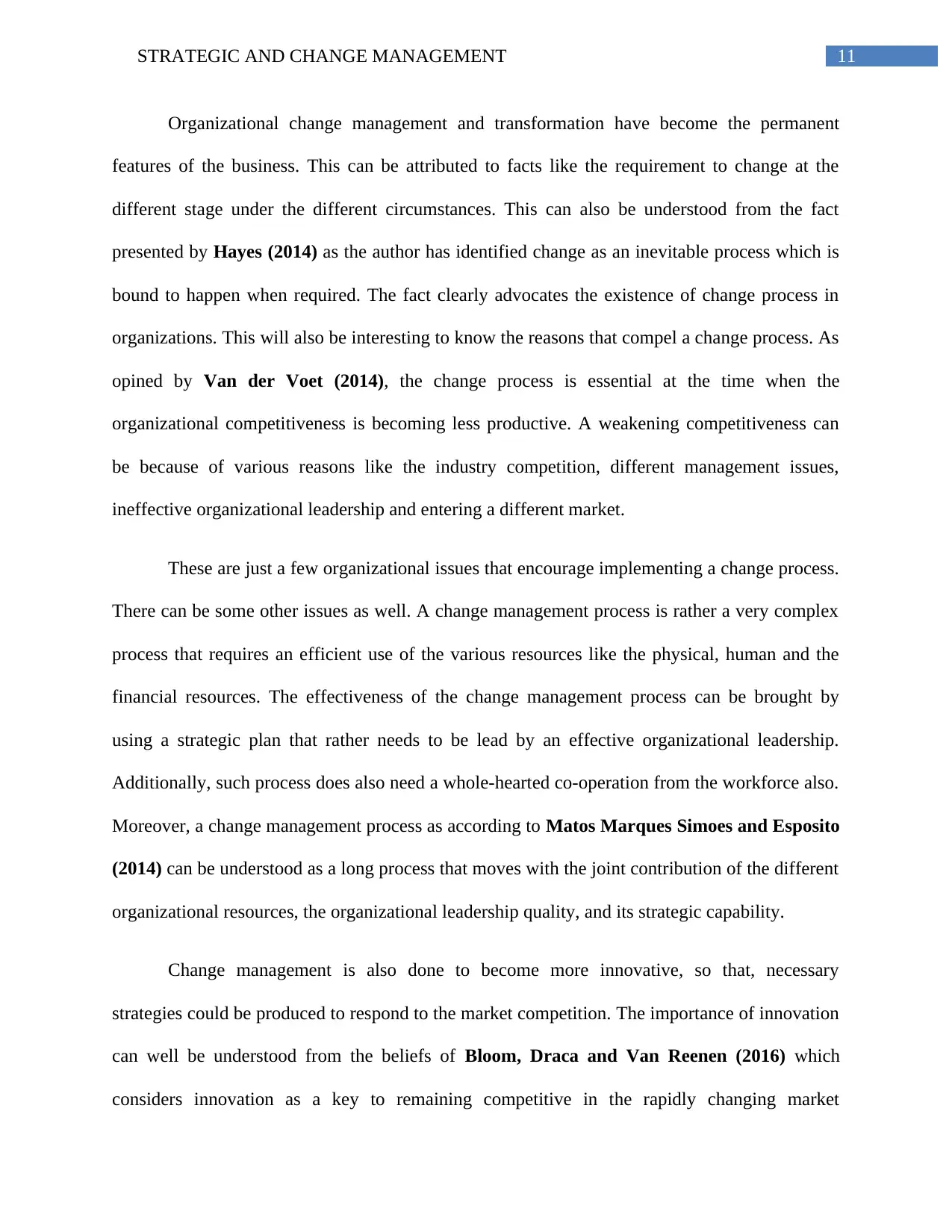
11STRATEGIC AND CHANGE MANAGEMENT
Organizational change management and transformation have become the permanent
features of the business. This can be attributed to facts like the requirement to change at the
different stage under the different circumstances. This can also be understood from the fact
presented by Hayes (2014) as the author has identified change as an inevitable process which is
bound to happen when required. The fact clearly advocates the existence of change process in
organizations. This will also be interesting to know the reasons that compel a change process. As
opined by Van der Voet (2014), the change process is essential at the time when the
organizational competitiveness is becoming less productive. A weakening competitiveness can
be because of various reasons like the industry competition, different management issues,
ineffective organizational leadership and entering a different market.
These are just a few organizational issues that encourage implementing a change process.
There can be some other issues as well. A change management process is rather a very complex
process that requires an efficient use of the various resources like the physical, human and the
financial resources. The effectiveness of the change management process can be brought by
using a strategic plan that rather needs to be lead by an effective organizational leadership.
Additionally, such process does also need a whole-hearted co-operation from the workforce also.
Moreover, a change management process as according to Matos Marques Simoes and Esposito
(2014) can be understood as a long process that moves with the joint contribution of the different
organizational resources, the organizational leadership quality, and its strategic capability.
Change management is also done to become more innovative, so that, necessary
strategies could be produced to respond to the market competition. The importance of innovation
can well be understood from the beliefs of Bloom, Draca and Van Reenen (2016) which
considers innovation as a key to remaining competitive in the rapidly changing market
Organizational change management and transformation have become the permanent
features of the business. This can be attributed to facts like the requirement to change at the
different stage under the different circumstances. This can also be understood from the fact
presented by Hayes (2014) as the author has identified change as an inevitable process which is
bound to happen when required. The fact clearly advocates the existence of change process in
organizations. This will also be interesting to know the reasons that compel a change process. As
opined by Van der Voet (2014), the change process is essential at the time when the
organizational competitiveness is becoming less productive. A weakening competitiveness can
be because of various reasons like the industry competition, different management issues,
ineffective organizational leadership and entering a different market.
These are just a few organizational issues that encourage implementing a change process.
There can be some other issues as well. A change management process is rather a very complex
process that requires an efficient use of the various resources like the physical, human and the
financial resources. The effectiveness of the change management process can be brought by
using a strategic plan that rather needs to be lead by an effective organizational leadership.
Additionally, such process does also need a whole-hearted co-operation from the workforce also.
Moreover, a change management process as according to Matos Marques Simoes and Esposito
(2014) can be understood as a long process that moves with the joint contribution of the different
organizational resources, the organizational leadership quality, and its strategic capability.
Change management is also done to become more innovative, so that, necessary
strategies could be produced to respond to the market competition. The importance of innovation
can well be understood from the beliefs of Bloom, Draca and Van Reenen (2016) which
considers innovation as a key to remaining competitive in the rapidly changing market
⊘ This is a preview!⊘
Do you want full access?
Subscribe today to unlock all pages.

Trusted by 1+ million students worldwide
1 out of 22
Related Documents
Your All-in-One AI-Powered Toolkit for Academic Success.
+13062052269
info@desklib.com
Available 24*7 on WhatsApp / Email
![[object Object]](/_next/static/media/star-bottom.7253800d.svg)
Unlock your academic potential
Copyright © 2020–2026 A2Z Services. All Rights Reserved. Developed and managed by ZUCOL.



